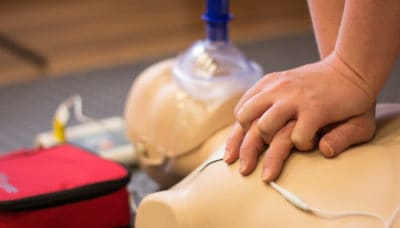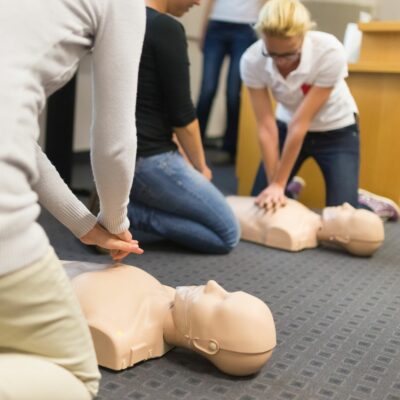Introduction
In today's hectic world, the ability to respond swiftly and successfully in emergency situations can be a game changer. With crashes occurring daily, having the child care safety training abilities to provide first aid or carry out mouth-to-mouth resuscitation (Cardiopulmonary Resuscitation) is invaluable. However is registering in an emergency treatment and CPR course absolutely worth it? Nevertheless, time and sources are valuable commodities.
In this post, we dig deep into the experiences of our students that have actually taken these crucial programs. They share understandings concerning their inspirations for signing up, what they discovered, and how it changed their outlook on emergency situations. By discovering their firsthand accounts along with research-backed information, we'll answer the burning inquiry: Is an Emergency Treatment and CPR Training Course Worth It? Here's What Our Pupils Say.
The Importance of Emergency treatment Training
Why Needs to You Consider an Emergency Treatment Course?
First help training gears up individuals with the expertise and skills required to give immediate aid throughout medical emergency situations. Whether it's treating small injuries like cuts and bruises or taking care of serious situations such as cardiac arrests, an emergency treatment course equips you to act decisively when every 2nd counts.
Benefits of Taking a First Aid Course
Taking an emergency treatment course provides numerous advantages:
Life-Saving Skills: The most substantial advantage is undoubtedly the ability to save lives. Confidence Boost: With knowledge comes confidence; learners really feel more ready to deal with emergencies. Community Impact: Trained people can contribute positively to their areas by giving aid when needed. Career Advancement: Several occupations need emergency treatment accreditation, making it an asset for work seekers. Personal Safety: Recognizing how to handle accidents or health and wellness concerns in the house guarantees security for family members.
Understanding CPR: A Crucial Skill
What Precisely is CPR?
CPR stands for Cardiopulmonary Resuscitation; it's an emergency situation procedure executed when someone's heartbeat or breathing has stopped. This technique includes breast compressions combined with fabricated air flow (mouth-to-mouth), which helps keep blood circulation and oxygenation up until specialist clinical help arrives.
Types of mouth-to-mouth resuscitation Courses Available
When checking out mouth-to-mouth resuscitation programs, you'll locate different kinds customized for various target markets:
- Basic Life Support (BLS): Suitable for medical care providers. Heartsaver CPR: Developed for laypeople without medical training. Pediatric CPR: Focused on methods applicable to youngsters and infants.
Is Learning CPR Difficult? A Pupil's Perspective
Many trainees share issue about whether finding out mouth-to-mouth resuscitation will certainly be difficult. Usually talking, while it needs practice and understanding of details methods, lots of people discover that hands-on training makes it easier to grasp vital concepts.
First Aid Certification: A Vital Credential
Why Get a First Aid Certificate?
An emergency treatment certification symbolizes that you have actually gotten official training in giving support throughout emergency situations. It serves as evidence of your competence in managing important scenarios securely and effectively.
How Long Does Accreditation Last?
Typically, emergency treatment certifications remain legitimate for two years prior to requiring renewal through re-training or correspondence course. This plan makes certain that people stay updated on existing techniques and techniques in emergency situation response.
Student Experiences: What Do They Claim Regarding Their Training?
Real Stories from Our Graduates
Our pupils have actually shared effective reviews mirroring best first aid training nearby their trips via emergency treatment and mouth-to-mouth resuscitation training courses:
"I never ever thought I 'd require this training until my kid choked eventually at supper."
"After taking the course, I seemed like I might take care of any kind of scenario that came my method."

"The hands-on technique made all the difference; I really really feel ready currently."

"I took this program because my work needed it yet ended up getting a lot extra."
"There's something extremely equipping about knowing you can help someone in distress."

"I went into it cynical yet left knowing I can conserve lives."
Is a First Aid and Mouth-to-mouth Resuscitation Training Course Worth It? Right here's What Our Pupils Say
Taking into account our students' comments exposes constant themes regarding their experiences with first aid and mouth-to-mouth resuscitation training courses:
Many trainees stress increased self-confidence post-training. The practical components are frequently highlighted as particularly beneficial. Graduates frequently mention feeling geared up to take care of real-life emergency situations right away after finishing their courses. The emotional contentment stemmed from being able to aid others is repeatedly mentioned as an indispensable result of the training.These beliefs collectively affirm that indeed, a first aid and mouth-to-mouth resuscitation course is indeed worth it!
Key Takeaways from Pupil Reviews on Emergency Treatment Courses
What Pupils Discovered During Their Training
Students report acquiring abilities varying from basic injury treatment techniques to sophisticated emergency feedback approaches:
- Understanding just how to assess an emergency scenario promptly Identifying symptoms of heart attacks or strokes Performing efficient upper body compressions Utilizing automated external defibrillators (AEDs)
Each aspect contributes substantially in the direction of boosting one's readiness for unanticipated scenarios.
How Training Altered Their Outlook on Emergencies
Many pupils shared that after finishing these training courses, they no longer checked out emergencies as overwhelming however rather as challenges they can manage properly with the ideal abilities at hand.
The Duty of Instructors in Emergency Treatment Training
Why High quality Instructors Matter in First Aid Courses?
The performance of any emergency treatment course largely depends upon its trainers' quality-- experienced fitness instructors bring real-world scenarios right into classrooms, making lessons relatable and engaging.
Attributes of Effective Emergency treatment Instructors
Strong communication skills Ability to streamline intricate concepts Engaging teaching methods Empathy in the direction of students' concernsStudents frequently mention their teachers' interest for the subject matter contributed considerably to their overall experience.
First Help Courses vs Online Training Programs: Which is Better?
Comparing Standard Courses with Online Options
While online emergency treatment training courses offer versatility in finding out at your own speed, typical class setups provide straight interaction with teachers-- making them excellent for hands-on practice sessions that are crucial in understanding life-saving techniques.
Pros & Cons Table of Each Training Method
|Feature|Traditional Programs|Online Courses|| ---------------------------|-----------------------|------------------------|| Hands-On Practice|Yes|No|| Versatility|Limited|High|| Interaction|Direct|Virtual|| Immediate Feedback|Yes|Restricted|
Based on these factors, several pupils prefer registering for traditional classes regardless of on the internet options being available as a result of their emphasis on useful ability development.
FAQs About First Aid and CPR Courses
FAQ 1: How long does it take to complete a first aid or CPR course?
Most emergency treatment programs usually vary from 4 to 8 hours depending on the depth of content covered while extensive programs might call for numerous days over a number View website of weeks leading up toward accreditation tests if applicable.
FAQ 2: Can anyone take a first aid and CPR course?
Absolutely! These courses are made for anybody interested irrespective of previous clinical expertise-- whether you're a moms and dad desiring assurance or a person looking for employment requiring training.
FAQ 3: Will certainly I get qualification upon completion?
Yes! Upon finishing your coursework successfully along with passing essential analyses you will certainly earn both accreditations verifying your skills!
FAQ 4: Are there age constraints for participating?
Generally speaking there aren't stringent age limitations however minors might require parental permission prior to signing up particularly if working in the direction of obtaining formal certifications.
FAQ 5: What should I anticipate throughout hands-on training sessions?
Expect interactive tasks where you'll practice strategies like wrapping wounds performing rescue breathing making use of mannequins etc, under guidance from certified instructors!
FAQ 6: Can I renew my accreditation online?
Many companies currently supply choices permitting existing certificate holders renew existing credentials by means of online refresher courses although some may still choose face-to-face re-training sessions!
Conclusion
In verdict, spending time right into taking a first aid and mouth-to-mouth resuscitation course is not just an instructional venture; it's an important step toward personal growth while furnishing oneself with life-saving abilities essential today more than ever given uncertain nature surrounding us daily!
With numerous success tales emerging from happy grads who have actually changed dilemmas right into opportunities with correct activity-- it ends up being clear why a lot of echo similar sentiments when asked if pursuing such programs confirms worthwhile!
So if you're still wondering whether "Is a First Aid and Mouth-to-mouth Resuscitation Program Well Worth It?" remember what our students state loudest-- it absolutely is!